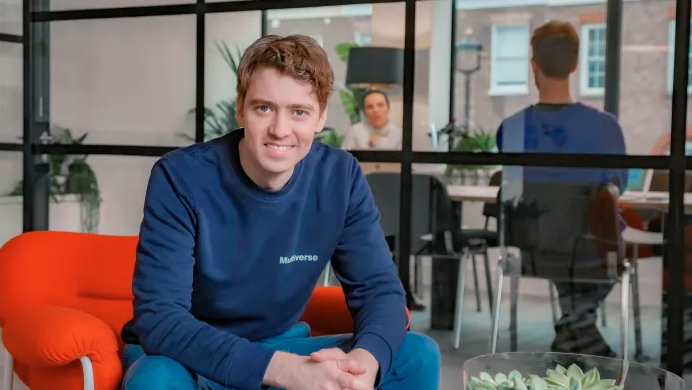Company Profile: Multiverse

In 2022, Multiverse became the UK’s first EdTech unicorn, with a $220 million Series D funding round, achieving a post-money valuation of $1.7 billion. This milestone cemented its innovative approach and rapid growth in the education technology sector.
Founded in 2016, Multiverse is an upskilling platform for AI and tech adoption, providing personalised, on-the-job learning for individuals at all ages and career stages. Since its founding, Multiverse has made significant strides in transforming the global workforce, having trained over 20,000 learners in critical AI, data and digital skills.
These programs have delivered substantial value to employers, with Multiverse learners driving over $2 billion in return on investment through improved productivity and measurable performance. The company has forged impactful partnerships with more than 1,500 employers, delivering learning solutions that are actively shaping a future-ready workforce and equipping employees to succeed in the AI era.
The founders
Euan Blair is a former Morgan Stanley banker who decided to leave investment banking in 2016 to do something “more socially motivated”. He graduated in Ancient History at Bristol and completed a master’s degree in International Relations at Yale. He served as an intern in the US Congress before joining Morgan Stanley’s graduate programme in 2008 (just weeks ahead of the financial crash). On banking, he said: “I found it really interesting but I didn’t love it, so I wanted to do something more aligned to policy areas I was interested in: employment and education.”
Then in 2016, he founded Multiverse as he noticed how increasingly prohibitive universities had become, and how apprenticeships could offer a solution for diversity and skill challenges in organizations. “If employers only look at those with college degrees, they automatically screen out 70% of the LatinX population and 67% of the black population. On top of that, colleges aren’t even teaching people the skills that will enable them to be successful in their careers. We simply can’t keep up with the pace of digital transformation,” said Euan Blair.
One early joiner was Sophie Ruddock, a former impact investor and consultant who now takes charge of Multiverse in North America. As VP and GM of North America at Multiverse, Sophie maintains that apprenticeships are the best way to develop the tech skills demanded by modern workplaces: skills in software engineering, data science and digital marketing. “It’s no wonder that in 2021 there is real momentum behind professional apprenticeships. We’ve seen the Biden Administration commit to investing $50 billion in training and apprenticeships, while some of the world’s best employers (IBM, Google and Walmart) have thrown themselves behind apprenticeships and applied learning,” she wrote in an article for Nasdaq.
The approach
Multiverse’s apprenticeship program is currently tackling the growing areas of data, software engineering and business operations, among others. The company does the sourcing and the matching, and then identifies potential candidates, as US General Manager Sophie Ruddock explained in an interview with Benzinga:
“That’s done through our recruitment platform that looks to surface skills, behaviors, desires, competencies like grit, conscientiousness, interpersonal skills, and really tear up the traditional resume.”
The system also enables past behaviors, past performance to be surfaced, instead of which college the candidate attended or what was his/her GPA, said Ruddock.
Multiverse then uses an algorithmically-assisted “smart matching” process to link talent to companies and specific roles. At the end of the process, ambitious, job-seeking talents are offered a paid, full-time role with access to subject matter taught by experts who have worked in the industry, and know how to teach a curriculum designed to impart knowledge, as well as skills and behavior.
The company’s model is also tapping into an urgent workforce issue: diversity. Euan said in an interview with TechCrunch, that currently over half of the people making their way through Multiverse are people of color, and 57% are women. The plan is to build tools to make that an even firmer part of its mission.
Multiverse’s apprenticeships typically take 1.5 years and connect candidates through a network of apprentices and alumni in virtual events, interest groups, and other activities. The program has no cost for candidates, who actually get paid by the companies providing the apprenticeships. Multiverse charges the companies it works with according to the type of qualification program they need, “but are broadly around the $15,000 mark,” said Euan to TechCrunch.
The challenges
As the company scales, Multiverse’s attention has been in the education of and delivery of their services, as GBxer and Regional Director at Multiverse, Mae Rogers explains: “In every conversation we need to explain what professional apprenticeship is. Everybody knows what blue collar apprenticeships are, and what we are doing is basically trading the apprenticeship model and applying it to roles in digital and tech where it makes more sense.”
Rogers also talked about the challenge of growing at a fast pace: finding enough experts in the industry able to sustain Multiverse’s quality coaching program. “We have someone like Marta Rodriguez Martinez who’s one of our data coaches. She led an AI team at Microsoft for 10 years, but she always had a passion for teaching. So our question is: Are we going to be able to find enough of that caliber of coaches in a short enough time as we scale?,” says Rogers in an interview to GBx.
Multiverse has a team of 15 people in the US, between New York and the Bay Area, but the plan is to be all over the States. “Most of our conversations right now are in Atlanta (Georgia), Dallas (Texas), and Raleigh (North Carolina). I think we will have people everywhere once we go back to an in-person world,” predicts Rogers.
You can connect with Mae Rogers on GBx Directory, GBx Slack, or LinkedIn.

